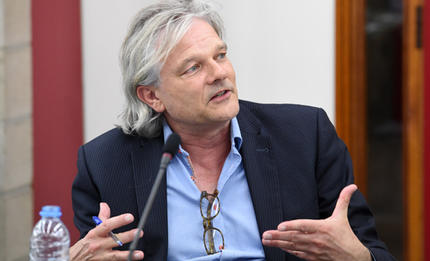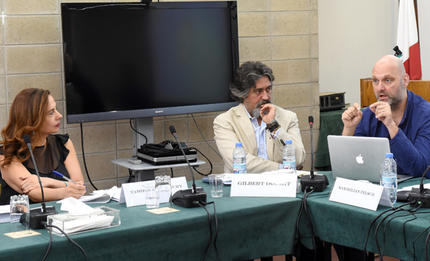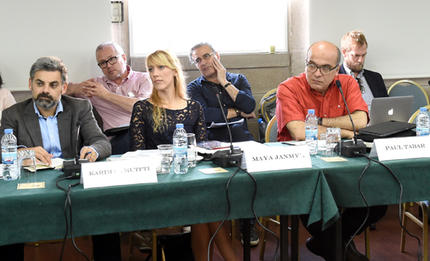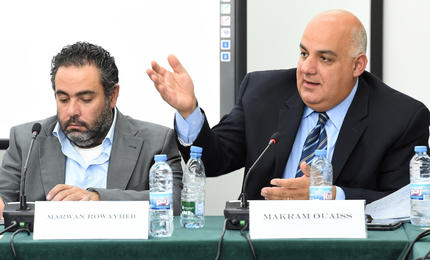Lebanon: actor or passive recipient of the Arab Spring
Conference by the Department of Social Sciences and the Center for Contemporary Middle East Studies explores impact of Arab Spring on Lebanon.

Professor Martin Beck described the workshop as a cross-Mediterranean cooperation that brought together researchers and academics from Europe and the Middle East.

LAU Associate Professor in Political Science and International Affairs Tamirace Fakhoury at one of the panels.

Speakers included Chair of the Department of Humanities Paul Tabar, AUB Professor Makram Rabah, Maya Janmyr, professor at the University of Oslo, and Karim el Mufti, associate professor at USJ.

LAU Assistant Professor of Political Science and International Affairs Makram Ouaiss with Marwan Rowayheb, chair of the Department of Social Sciences.
The Department of Social Sciences and the Center for Contemporary Middle East Studies at the University of Southern Denmark (SDU) co-organized a two-day workshop titled “The impact of the ‘Arab Spring’ on socio-political developments in Lebanon: Preconditions, process, and consequences” at LAU Byblos campus, in October.
LAU Associate Professor of Political Science and International Affairs Tamirace Fakhoury and Professor Martin Beck, chair of the Center for Contemporary Middle East Studies, co-applied for a seed fund from SDU in 2016 to host the conference at LAU as a platform to generate ideas and insights for a broader research project.
In his welcoming speech, LAU Professor of Political Science Sami Baroudi, representing Dean of School of Arts and Sciences Nashat Mansour, said that the workshop was part of the department’s continuous initiatives to collaborate with local and international academics and policy makers “in order to provide the community, our eco-system, with theoretically informed and evidence-based analysis of issues facing Lebanon.”
The conference revolved around four panels “demonstrating how Lebanon was heavily influenced by the Arab Spring, its narratives, dynamics and spillovers,” said Fakhoury. Each panel discussion looked at Lebanon from a different angle: the domestic level — both “from below” and “from above” — the international level, and the level of political discourse in media and academia.
Beck described the workshop as a cross-Mediterranean cooperation that brought together researchers and academics from Europe and the Middle East. What set it apart, he said, was that the participants wanted to emphasize Lebanon’s role as an “actor rather than merely a passive recipient” of the regional turmoil following the Arab uprisings.
The first panel, chaired by Marwan Rowayheb, associate professor of Political Science and International Affairs and chair of the Department of Social Sciences, examined how social movements developed following the regional uprisings and the influx of Syrian refugees to Lebanon, adopting a “from below” approach, and their impact on the domestic level.
Each of the four panelists discussed how recent social movements in Lebanon have been inspired by the Arab Spring’s re-politicization of issues related to good governance. In his presentation, “Civil Society: Alternative pathway for political change?” LAU Assistant Professor of Political Science and International Affairs Makram Ouaiss considered whether civil society had made any real contribution toward political reform.
Among the failures of civil society, Ouaiss listed the inability to overcome internal divisions, perfect tools to effectively participate in elections and maintain their objectives if elected. On the other hand, civil society movements succeeded in raising awareness and mobilization, and played an active role in supporting civil peace.
Chaired by John Nagle of the University of Aberdeen, the second panel adopted a “from above” approach, analyzing the reaction of Lebanon’s political establishment to the grassroots mobilization in the country and to the spillovers of the uprisings. Speakers, including Chair of the Department of Humanities Paul Tabar, AUB Professor Makram Rabah, Maya Janmyr, professor at the University of Oslo, and Karim el Mufti, associate professor at USJ, exchanged ideas and findings on the response of the Lebanese political class to the formation of social movements. While the political leadership’s reaction was diverse and contradictory, it still followed the “logic of sectarian pluralism” as a strategy.
The third panel, chaired by Fakhoury, discussed Lebanon’s security and geopolitical status within the regional transformations that have resulted in the wake of the Arab Spring. Beck, one of the speakers, shed light on the strategies used by the Lebanese leadership to cope with the refugee influx from Syria, while senior fellow at The Century Foundation Thanassis Cambanis spoke about the role of Hezbollah. “Lebanon is one of the most important testing grounds for political ideas in the Middle East, as well as for foreign intervention, and it is under-studied by policy makers and academics alike,” says Cambanis. “The workshop hosted by LAU provided a rare opportunity to ask about Lebanon’s role in shaping the region’s politics — and not just to think about Lebanon as an object of the machinations of outside forces.”
The fourth panel, chaired by LAU Assistant Professor of Political Science and International Affairs Jennifer Skulte-Ouaiss, tackled an under-researched theme: how the academic debates and the Lebanese media have shaped the discourse on the “Arab Spring” and social movements in Lebanon.
The participants, said Fakhoury, “were asked in the final roundtable to share suggestions on how they can imagine contributing to a broader research project with the University of Southern Denmark.”
More
Latest Stories
- LAU Engages High Schoolers With Creative Expression and Scholarship Awards
- How Does Digital Media Impact Our Brain?
- Community Development Takes Root at Capstone Presentation Day
- LAU Athletes Return Victorious from Athens and Belgrade
- A New Initiative Toward Harnessing Digital Transformation
- A Cardiovascular Conference to Streamline National Expertise
- Aspiring Engineers Compete for Scholarships at LAU
- The School of Engineering Delivers Immersive Learning Experiences

